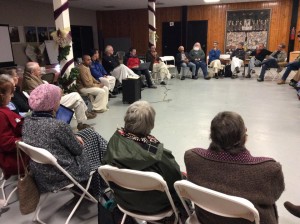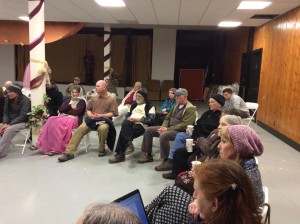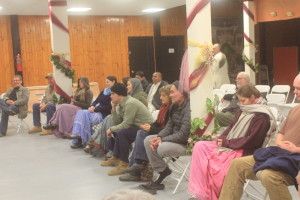Village Council Proposed at New Vrindaban Community Dialogue
By Madhava Smullen
Nearly 40 New Vrindaban residents and board members gathered for a community dialogue on March 14th, 2015 to discuss starting a Village Council, which could provide residents with a voice and facilitate a more comprehensive community governance.
After a sweet kirtan and introductions all around that created a mood of warmth and humor, Joint Board Member Chaitanya Mangala Das introduced the topic, saying that the non-profit religious corporate structure New Vrindaban has used until now was like “trying to fit a square peg into a round hole.”
“Corporations, with their legal frameworks, rules and restrictions,” he said, “Don’t work for a more democratic body involving people in this kind of community setting.” He added that the Village Council concept was a new attempt by the Joint Boards at an ongoing effort to involve the broader community.
The inspiration behind the idea, he explained, came from a 1973 quote by Srila Prabhupada, instructing the leaders of New Vrindaban to “Go on acquiring the surrounding lands and in this way we will establish a local self-governing village, and show all the world a practical example of spiritual life as Krishna Himself exhibited in Vrindaban.”
Chaitanya Mangala further summarized the Village Council proposition with three buzz words – small, local, and simple.
“Small: the proposed council could consist of five to eight key representatives from the ECO-V and ISKCON New Vrindaban Boards, the Advocacy Sanga, and other community interests such as local non-profits or businesses,” he said.
“Local: since the new council will represent the New Vrindaban village, members will have to live in it and be able to meet face to face on a regular basis,” he went on. “And simple: there should be few preconditions made before the Council is formed, with the focus on simply getting the group in a room talking on a regular basis.”
Chaitanya Mangala also pointed out that while a subcommittee consisting of Joint Board Members Dayavira Das, Ananga Manjari Dasi, Madhava Gosh Das, and president Jaya Krishna Das, had worked on the Village Council concept, they intentionally hadn’t filled in more specific details, leaving that for the Village Council “steering committee” to do.
As the discussion opened up to the floor, Nityodita Das of the community’s Advocacy Sanga expressed his group’s appreciation that two of its top priorities – devotee care and governance – were also being made a priority by New Vrindaban leadership.
He said that apathy in the community was to some degree caused by frustration at having no avenue to influence its direction. The Village Council, if successful, would be a helpful solution.
He concluded that a more inclusive system was needed so that people could express themselves, and pointed out that in the end all parties wanted the same thing – for New Vrindaban to be a more loving, Krishna conscious, united community.
Next Jesse, also from the Advocacy Sanga, expressed appreciation for the developments but also disillusionment. After spending a year-and-a half in the Advocacy Sanga, what he saw as a similar effort to the proposed Village Council, he felt they had failed to create a bridge between the temple management and community members, and was skeptical that a new organization would have any impact. However he did hope that it would.
Advaita Das responded with an impassioned, inspirational speech in which he opined that the Advocacy Sanga was a success – and that the current plan for a Village Council wouldn’t be happening without it. He also echoed Nityodita’s thoughts on apathy being a problem in New Vrindaban, which he felt was a result of people not being appreciated and recognized.
Commenting that this was an opportunity for residents to take responsibility for creating what they want, ECO-V’s new project manager Mukunda Das suggested that they didn’t have to reinvent the wheel. “We can learn about the specifics of creating a Village Council,” he said, “From many successful intentional communities that already have Village Councils.”
Professor Burke Rochford, who has studied ISKCON since the 1970s and written many scholarly books and articles about it, was then invited to offer his reflections on the idea.
Calling it “an important conversation,” he said, “New Vrindaban, in contrast to other ISKCON temples, was specifically envisioned by Prabhupada as a community, and while that makes it a different and special place, it also makes for certain inherent challenges that other temples don’t have.”
Rochford mentioned that when he surveyed the New Vrindaban community some years ago, one thing that stood out to him was how the residents felt alienated because of the emphasis on the place (as being a holy pilgrimage) rather than on the people.
“Ten years later, the conversation is very similar,” he said. “But now’s the time for it to lead to something. This is your community, and the Village Council is an opportunity for the voices of the people to be heard.”
Rochford’s observations were echoed in the discussion that followed, with many saying they felt community members were not being put first and expressing the wish for an overall increase in focus on devotee care.
Advaita then turned the conversation back to the practicalities of a working Village Council, commenting that it was critical that the Joint Boards were represented on the Council and were attentive to the residents, to ensure that decisions are supported at the board level.
Meanwhile Nityodita offered the Advocacy Sanga’s open Wednesday meetings as a venue to continue developing the Village Council.
As the dialogue wound down, New Vrindaban co-GBC Anuttama Das observed that its general mood had been a positive one of “there may be disagreements, but let’s try to improve things together.” He quoted Bhaktivinode Thakur as saying, “progress is a gradual series of adjustments moving in the right direction.”
He acknowledged that trust needed to be rebuilt, which was a two-way street. He added that he saw the afternoon’s dialogue as real tangible progress and said, “If we work together, Krishna will continue to move us forward.”
In closing, Chaitanya Mangala said that the input and participation of every single person present mattered. He expressed that while there was no specific vision yet, the process of getting a Village Council up and running had been started.
Moving on, the Joint Boards, the Advocacy Sanga, and other groups and individuals will come together to formulate a practical plan.
“This could create a wonderful example of what Srila Prabhupada wanted us to do when he made his famous statement, ‘Your love for me will be shown by how much you cooperate to keep this institution together after I am gone,” concluded ISKCON New Vrindaban president Jaya Krishna Das.





